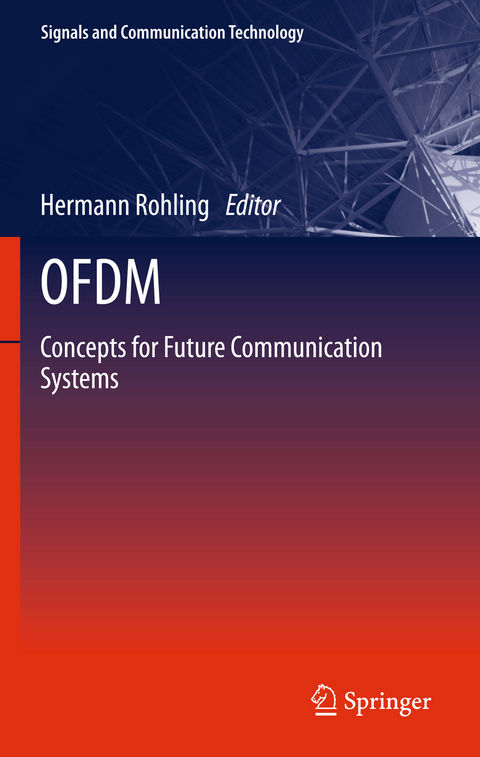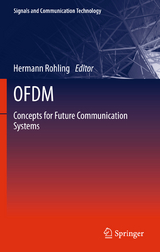OFDM
Concepts for Future Communication Systems
Seiten
2011
|
2011
Springer Berlin (Verlag)
978-3-642-17495-7 (ISBN)
Springer Berlin (Verlag)
978-3-642-17495-7 (ISBN)
The Orthogonal Frequency Division Multiplexing (OFDM) digital transmission technique has advantages in broadcast and mobile communications applications. This book gives a good insight into these, and provides an overview of the scientific progress.
(Preliminary): The Orthogonal Frequency Division Multiplexing (OFDM) digital transmission technique has several advantages in broadcast and mobile communications applications. The main objective of this book is to give a good insight into these efforts, and provide the reader with a comprehensive overview of the scientific progress which was achieved in the last decade. Besides topics of the physical layer, such as coding, modulation and non-linearities, a special emphasis is put on system aspects and concepts, in particular regarding cellular networks and using multiple antenna techniques. The work extensively addresses challenges of link adaptation, adaptive resource allocation and interference mitigation in such systems. Moreover, the domain of cross-layer design, i.e. the combination of physical layer aspects and issues of higher layers, are considered in detail. These results will facilitate and stimulate further innovation and development in the design of modern communication systems, based on the powerful OFDM transmission technique. The Orthogonal Frequency Division Multiplexing (OFDM) digital transmission technique has several advantages in broadcast and mobile communications applications. The main objective of this book is to give a good insight into these efforts, and provide the reader with a comprehensive overview of the scientific progress which was achieved in the last decade. Besides topics of the physical layer, such as coding, modulation and non-linearities, a special emphasis is put on system aspects and concepts, in particular regarding cellular networks and using multiple antenna techniques. The work extensively addresses challenges of link adaptation, adaptive resource allocation and interference mitigation in such systems. Moreover, the domain of cross-layer design, i.e. the combination of physical layer aspects and issues of higher layers, are considered in detail. These results will facilitate and stimulate further innovation and development in the design of modern communication systems, based on the powerful OFDM transmission technique.
(Preliminary): The Orthogonal Frequency Division Multiplexing (OFDM) digital transmission technique has several advantages in broadcast and mobile communications applications. The main objective of this book is to give a good insight into these efforts, and provide the reader with a comprehensive overview of the scientific progress which was achieved in the last decade. Besides topics of the physical layer, such as coding, modulation and non-linearities, a special emphasis is put on system aspects and concepts, in particular regarding cellular networks and using multiple antenna techniques. The work extensively addresses challenges of link adaptation, adaptive resource allocation and interference mitigation in such systems. Moreover, the domain of cross-layer design, i.e. the combination of physical layer aspects and issues of higher layers, are considered in detail. These results will facilitate and stimulate further innovation and development in the design of modern communication systems, based on the powerful OFDM transmission technique. The Orthogonal Frequency Division Multiplexing (OFDM) digital transmission technique has several advantages in broadcast and mobile communications applications. The main objective of this book is to give a good insight into these efforts, and provide the reader with a comprehensive overview of the scientific progress which was achieved in the last decade. Besides topics of the physical layer, such as coding, modulation and non-linearities, a special emphasis is put on system aspects and concepts, in particular regarding cellular networks and using multiple antenna techniques. The work extensively addresses challenges of link adaptation, adaptive resource allocation and interference mitigation in such systems. Moreover, the domain of cross-layer design, i.e. the combination of physical layer aspects and issues of higher layers, are considered in detail. These results will facilitate and stimulate further innovation and development in the design of modern communication systems, based on the powerful OFDM transmission technique.
Prof. Dr. Hermann Rohling ist Leiter des Arbeitsbereiches Elektrotechnik II (Nachrichtentechnik) an der TU Hamburg-Harburg.
Introduction.- Channel Modeling.- Link Level Aspects.- System Level Aspects for Single Cell Scenarios.- System Level Aspects for Multiple Cell Scenarios.- OFDM/DMT for Wireline Communications.
| Erscheint lt. Verlag | 23.3.2011 |
|---|---|
| Reihe/Serie | Signals and Communication Technology |
| Zusatzinfo | XIV, 254 p. |
| Verlagsort | Berlin |
| Sprache | englisch |
| Maße | 155 x 235 mm |
| Gewicht | 540 g |
| Themenwelt | Technik ► Elektrotechnik / Energietechnik |
| Schlagworte | Adaptive resource allocation • cellular networks • Cross-layer design • Digital Video Broadcast DVB-T • Interference mitigation • Link Adaptation • Multiple antenna techniques • OFDM • OFDM (Orthogonal Frequency Division Multiplex) |
| ISBN-10 | 3-642-17495-7 / 3642174957 |
| ISBN-13 | 978-3-642-17495-7 / 9783642174957 |
| Zustand | Neuware |
| Haben Sie eine Frage zum Produkt? |
Mehr entdecken
aus dem Bereich
aus dem Bereich
Technologie – Berechnung – Klimaschutz
Buch | Hardcover (2023)
Hanser (Verlag)
39,99 €




